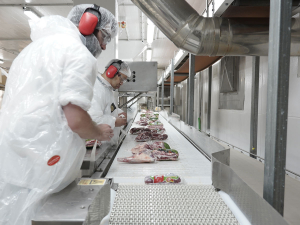Global team cultivates New Zealand premium eating grape vineyard
A multi-cultural team is helping to establish one of New Zealand's largest plantings of premium eating grapes - while learning each other's languages and cultures along the way.
 The Meat Industry Association says the extra 500 overseas workers will help but there are about 2,000 vacancies currently in the meat industry around NZ.
The Meat Industry Association says the extra 500 overseas workers will help but there are about 2,000 vacancies currently in the meat industry around NZ.
An extra 500 workers will certainly help but only if they get here in time.
So says Meat Industry Association chief executive Sirma Karapeeva following the Government's recent decision to allow an additional 500 migrant workers into NZ to work in the meat industry.
Karapeeva says it is great that the Government is actually acknowledging that there is a "real and chronic" labour shortage facing the meat industry and the extra workers will help to alleviate the pressure. But she told Rural News that a question mark hangs over the ability of Immigration NZ to process those visas quickly enough to get them working in NZ within the next month or so.
Karapeeva says there is a lot of pre-application work required, such as the migrants obtaining medical clearances and other checks.
"If a NZ company is working with a good recruiter overseas, that can be streamlined. The question is, once Immigration NZ receives the application, how quickly can they process that application to give the particular person the green light to come to NZ and start work?"
She says past experience suggests that the immigration system is "groaning" and has been for a very long time.
Karapeeva believes this raises the question about whether Immigration NZ will be able to cope with the huge number of applications. She says most of the migrant workers have some skills and will receive additional training when they arrive, and on the job, so there shouldn't be a huge time lag in upskilling these people.
It is estimated there are about 2,000 vacancies in the meat industry around NZ.
"Despite this labour shortage, the processing plants are doing everything they can to operate under such tight conditions, including extending and putting on new shifts," Karapeeva told Rural News.
"But they don't have enough people and that means that the carcass is not fully processed and that means that some value is lost."
She adds that given the current labour shortage, many companies are making hard decisions about whether to drop some of their further processing.
Karapeeva says the advantage of having migrant workers means there is a greater likelihood of having a killing chain operating at full capacity. She says that helps protect all jobs.
Fonterra’s impending exit from the Australian dairy industry is a major event but the story doesn’t change too much for farmers.
Expect greater collaboration between Massey University’s school of Agriculture and Environment and Ireland’s leading agriculture university, the University College of Dublin (UCD), in the future.
A partnership between Torere Macadamias Ltd and the Riddet Institute aims to unlock value from macadamia nuts while growing the next generation of Māori agribusiness researchers.
A new partnership between Dairy Women’s Network (DWN) and NZAgbiz aims to make evidence-based calf rearing practices accessible to all farm teams.
Despite some trying circumstances recently, the cherry season looks set to emerge on top of things.
Changed logos on shirts otherwise it will be business as usual when Fonterra’s consumer and related businesses are expected to change hands next month.

OPINION: Here w go: the election date is set for November 7 and the politicians are out of the gate…
OPINION: ECan data was released a few days ago showing Canterbury farmers have made “giant strides on environmental performance”.